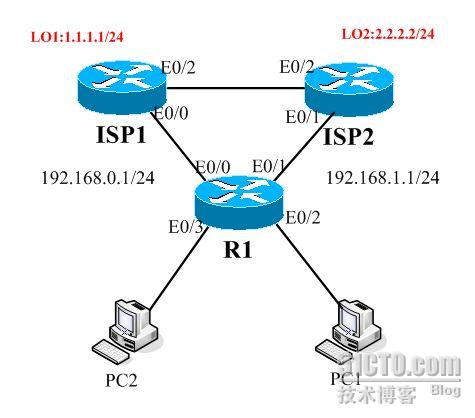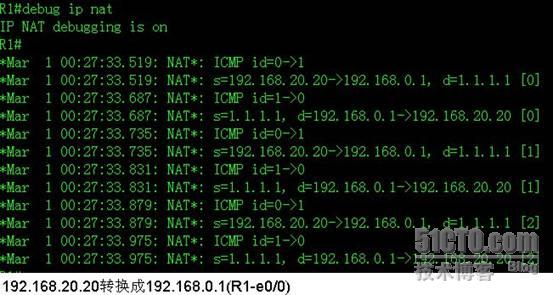Cisco双ISP线路之单路由器解决方案
Cisco
双ISP线路路径优化备份冗余之
单路由器解决方案
通过双ISP(如:一条电信、一条网通)链路可实现网络路径优化、负载均衡及备份冗余,以前本人一直认为Cisco不能实现单路由器双ISP链路的冗余备份,后经过多次测试,发现通过SLA(服务水平)+route-map完全可以实现,在这里愿意和大家一起分享。
网络拓朴:
 实验任务:
实验任务:
l
PC1/PC2
到1.1.1.1流经ISP1,PC1/PC2到2..2.2.2流经ISP2
l
通过SLA+Route-map实现网络路径优化、负载分担、备份冗余
环境描述:
l
3
台
Cisco3640 + NE-4E
模块,该配置拥有4个Ethernet、2台PC
l
ISP1
、ISP2分别模拟两个不同ISP(internet服务提供商)
l
ISP1 loopback1:1.1.1.1/24
、ISP2 loopback
1:2.2.2.2/24
用来测试
l
R1
作为企业边界路由器e0/0、e0/1、分别连接ISP1、ISP2
地址分配:
|
设备名称
|
接口
|
IP
地址
|
描述
|
|
R1
|
E0/0
|
192.168.0.1/24
|
TO ISP1
|
|
E0/1
|
192.168.1.1/24
|
TO ISP2
|
|
|
E0/2
|
192.168.20.1/24
|
TO PC1
|
|
|
E0/3
|
192.168.30.1/24
|
TO PC2
|
|
|
ISP1
|
E0/2
|
192.168.2.1/24
|
TO ISP2
|
|
E0/0
|
192.168.0.2/24
|
TO R1
|
|
|
ISP1
|
E0/2
|
192.168.2.2/24
|
TO ISP1
|
|
E0/1
|
192.168.1.2/24
|
TO R1
|
|
|
PC1
|
NIC
|
192.168.20.20/24
|
TO R1-E0/2
|
|
PC2
|
NIC
|
192.168.30.30/24
|
TO R1-E0/3
|
详细配置:
1
、IP地址设置
ISP1 (config) #int e0/2
ISP1 (config-if) #ip add
192.168.2.1
255.255.255.0
ISP1config-if) #no shutdown
ISP1
(
config
)
# int e0/0
ISP1 (config-if) #ip add
192.168.0.2
255.255.255.0
ISP1config-if) #no shutdown
ISP1
(
config
)
# int lo1
ISP1 (config-if) #ip add
1.1.1.1
255.255.255.0
ISP1(onfig-if) #no shutdown
………………………………………………………………………….
ISP2 (config) #int e0/2
ISP2 (config-if) #ip add
192.168.2.2
255.255.255.0
ISP2 (onfig-if) #no shutdown
ISP2
(
config
)
# int e0/1
ISP2 (config-if) #ip add
192.168.1.2
255.255.255.0
ISP2config-if) #no shutdown
ISP2
(
config
)
# int lo1
ISP2 (config-if) #ip add
2.2.2.2
255.255.255.0
ISP2 (config-if) #no shutdown
……………………………………………………………………………
R1 (config) #int e0/0
R1 (config-if) #ip add
192.168.0.1
255.255.255.0
R1 (config-if) #no shutdown
R1 (config
)
# int e0/1
R1 (config-if) #ip add
192.168.1.1
255.255.255.0
R1 (config-if) #no shutdown
R1 (config
)
# int e0/2
R1 (config-if) #ip add
192.168.20.1
255.255.255.0
R1 (config-if) #no shutdown
2
、定义相关ACL
R1(config)#ip access-list extended
all-net
……………………
匹配所有
R1(config-ext-nacl)#permit ip any any
R1(config)#access-list permit 1 192.168.0.2…………
匹配
ISP1 next-hop
R1(config)#access-list permit 2 192.168.1.2…………
匹配
ISP2 next-hop
3
、Route-map、Nat
R1(config)#route-map
isp1-line
permit 10
R1(config-route-map)#match ip address all-net
R1(config-route-map
)#match ip next-hop 1……………….
匹配
ACL 1
(关键)
R1(config)#route-map
isp2-line
permit 10
R1(config-route-map)#match ip address all-net
R1(config-route-map
)#match ip next-hop 2……………….
匹配
ACL 2
(关键)
R1(config)#
ip nat inside source
route-map isp1-line
int e0/0 overload
R1(config)#
ip nat inside source
route-map isp2-line
int e0/1 overload
4
、IP SlA、rtr/track
本地路由设备到ISP中间往往连接一个光电转换器(Layer2),当对端shutdown状态,本地设备仍处于UP,这时将导致所谓的“黑洞”现象,我们可以通过SLA来做
网络端到端的可用性监测
,从而解决这个问题。
R1(config)#rtr 1
R1(config-sla-monitor)#type echo protocol ipIcmpEcho 192.168.0.2
R1(config-sla-monitor-echo)#timeout 1200 ……..echo
超时1200 million second
R1(config-sla-monitor-echo)#frequency 3……….
发送icmp echo包频率3seonds
R1(config)#ip sla monitor schedule 1 life forever start-time now
R1(config)#rtr 2
R1(config-sla-monitor)#type echo protocol ipIcmpEcho 192.168.1.2
---
采用
icmp
协议来监视,即发出
icmp echo
包来探测对端的可达性
,192.168.1.2
为对端IP地址
R1(config-sla-monitor-echo)#timeout 1200
R1(config-sla-monitor-echo)#frequency 3
R1(config)#ip sla monitor schedule 2 life forever start-time now
定义SLA监视组
R1(config)#track 111 rtr 1 reachability…………………….
定义跟踪组
R1(config)#track 222 rtr 2 reachability
5
、写路由
ISP1 (config) #router ospf 1
…………………………启用
OSPF
协议
ISP1 (config-router) #net 0.0.0.0 255.255.255.255 area 0
ISP2 (config) #router ospf 1
ISP2 (config-router) #net 0.0.0.0 255.255.255.255 area 0
R1 (config) #roueter ospf 1
R1 (config-router) #net 0.0.0.0 255.255.255.255 area 0
-----------------------------------------------------------------------
R1(config)#ip route 1.1.1.0 255.255.255.0 192.168.0.2 track 111
R1(config)#ip route 2.2.2.0 255.255.255.0 192.168.1.2 track 222
R1(config)#ip route 0.0.0.0 0.0.0.0 192.168.0.2 track 111
R1(config)#ip route 0.0.0.0 0.0.0.0 192.168.1.2 track 222
实验测试:
1、
在PC1上cmd ping 1.1.1.1 R1 debug ip nat
 在PC1上cmd ping 2.2.2.2 R1 debug ip nat
在PC1上cmd ping 2.2.2.2 R1 debug ip nat
 在R1上 e0/0 shutdown ping 1.1.1.1
在R1上 e0/0 shutdown ping 1.1.1.1

4、
在ISP1路由器上e0/0 shutdown后

实验总结:
以前一直以为cisco单路由设备在做双ISP链路时,只能实现线路的负载分担、不能实现真正的线路冗余(一条链路失效会造成黑洞现象),因为NAT转换时不够灵活。
以前思路的配置:
1、
定义两个
ACL
R1(config)#no ip access-list extended isp1
R1(config-ext-nacl)#permit ip any 1.1.1.0 0.0.0.255
R1(config)#no ip access-list extended isp2
R1(config-ext-nacl)#permit ip any 2.2.2.0 0.0.0.255
2、
定义两个route-map
R1(config)#route-map isp1-line permit 10
R1(config-route-map)#match ip address isp1
R1(config)#route-map)#set ip next-hop 192.168.0.2
R1(config)#route-map isp2-line permit 10
R1(config-route-map)#match ip address isp2
R1(config)#route-map)#set ip next-hop 192.168.1.2
3、
NAT/Route-map
R1(config)#ip nat inside sourse route-map isp1-line int e0/0 over
R1(config)#ip nat inside sourse route-map isp2-line int e0/1 over
通过以前思路的配置不难发现,当一条ISP链路失效时,数据包经过路由图条件匹配,仍会经过NAT转换(很不灵活),这样数据包出去却不能返回,造成“黑洞”,不能达到真正的线路冗余。
通过这次实验再次说明route-map工具确实很强大,很灵活,能解决不少实际问题,在这个地方它可以迷补NAT的一些缺陷。